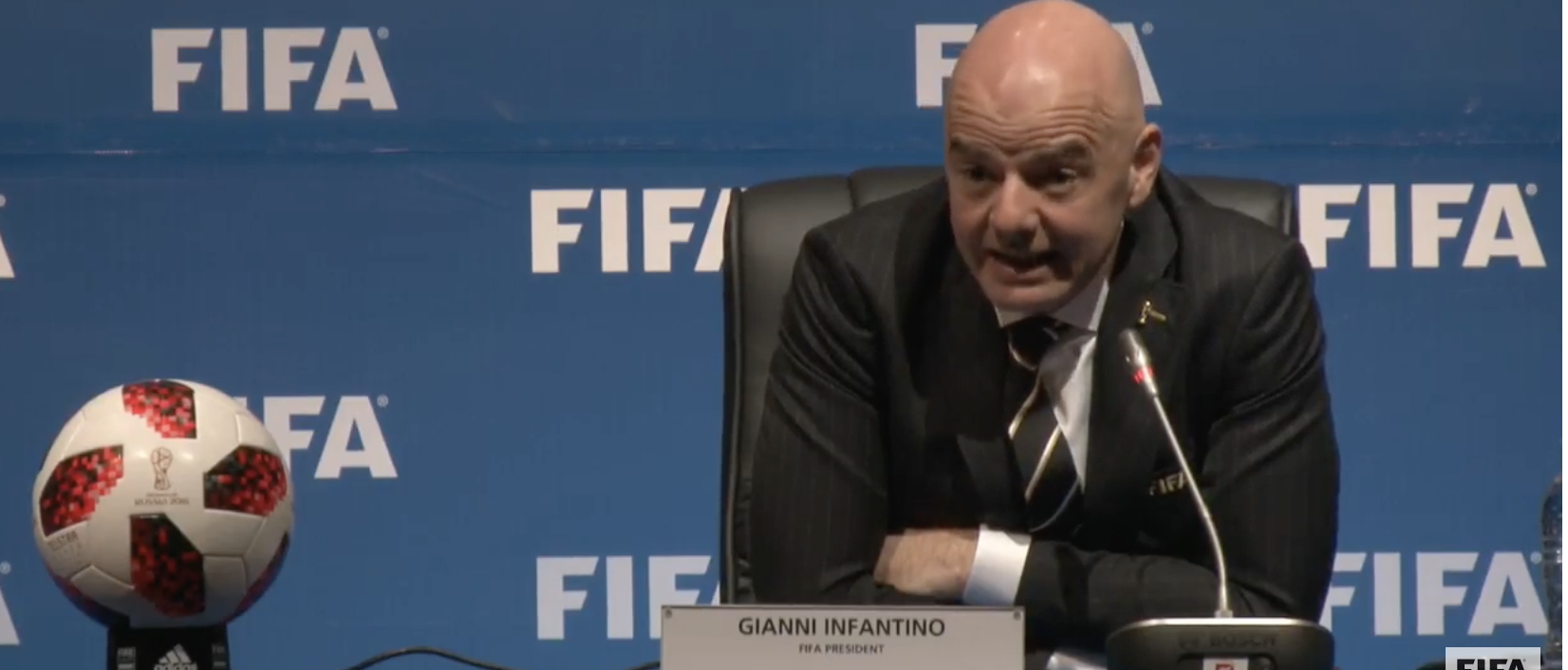By Andrew Warshaw
October 26 – Gianni Infantino’s pet plan to change the landscape of world football competition was shelved for another five months today as he all but admitted that not enough consultation had taken place.
Avoiding a possible showdown with European football chiefs over proposals to organise a fully-fledged Club World Cup and a new global Nations League-style tournament, Infantino announced, following an eagerly awaited meeting of the FIFA Council in Rwanda, that a special Task Force, with himself as chairman, was being set up to analyse the feasibility of the eye-watering $25 billion concept with a final decision set for next spring.
In the days leading up to the session, Infantino, who had already seen his plans kicked off the table in May, had been buffeted from all sides as criticism mounted over both the principle of the idea and suggestions that the consortium involved included Saudi money.
There was even talk of a walkout by European FIFA Council members over Infantino’s blueprint for an expanded 24-team Club World Cup which UEFA views as a direct challenge to the Champions League.
FIFA has consistently downplayed reports that a large part of the money is coming from Saudi Arabia and Infantino, who is seeking re-election as FIFA president next year and has promised member associations huge increases in development funding, again insisted that “there is no sovereign fund of any state. It’s a private company.”
Yet he couldn’t resist having a go at critics of the plan for over-egging the rumoured Saudi connection. “Many sovereign funds of many states have agreements in many parts of the world. This doesn’t seem to be a problem for anyone except when it comes to football,” Infantino told a post-Council globally streamed press conference.
With these comments Infantino perhaps displayed a fundamental misunderstanding of the mission of FIFA which promotes political neutrality (which would preclude marrying with a sovereign wealth fund and should be a ‘problem for football’) and is not structured as a commercial enterprise but has different priorities.
Not for the first time, he refused to divulge who the investors actually were but, tellingly, conceded that FIFA “could have done things better” in terms of consulting the necessary stakeholders in advance of announcing the proposed new game-changing format which many believe could undermine the World Cup itself.
“Hopefully we will try to do that as of now,” promised Infantino, admitting that “some decisions need time to evolve” and that “all views would now be gathered” by FIFA’s Bureau of the Council, which comprises the six confederation presidents. Findings will then be presented, including the commercial aspect, to the Council’s next session scheduled to take place in Miami in mid-March.
Although he admitted he may have been premature in going public with his blueprint, Infantino nevertheless denounced what he claimed was the over-dramatic reaction from opponents – notably clubs, leagues and UEFA. In other words, most stakeholders.
“I don’t know why discussing football competitions round the world needs to take such a dramatic tone,” he said of the media’s reporting of all the objections. “There are some parties who have different interests and that’s fine. But everyone agrees that the Club World Cup has to be revamped, everyone in the world.”
“We were never going to decide today. We put different options on the table and we will work to see whether we can find something that suits everyone. Once we have finalised the proposals then we will see what commercial impact these competitions will have.
“We need to know whether we play the Club World Cup every four years or every year with eight or 16 of 24 or 32 teams, whether we play a global nations league with matches between teams from different confederations and whether it takes place over four or six or eight matchdays. These are all elements to be taken into account when looking at the commercial exploitation. Only when we take a final decision can we be criticised by those who disagree. But hopefully the majority will agree.”
Infantino, who took the opportunity during the press conference to bang the drum over how he had personally transformed FIFA’s “toxic brand” since coming to power following 16 years at UEFA, continued to pull no punches as he questioned why there was so much opposition to what he claimed was FIFA’s duty to develop the game.
“When I was at UEFA, I argued with the clubs in often harsh tones. Some people opposed anything UEFA proposed. But then you need to move ahead and take decisions. We have to take our responsibility at FIFA seriously and think about what we are here for, which is world football. Leadership is not just about trying to get nothing done in order to make everyone happy.”
In other issues, the FIFA Council approved a tripling of prize money for the Women’s World Cup in France in 2021 and warned the Spanish league not to take the much-publicised Girona-Barcelona game overseas to Miami in January.
In a statement after the meeting, FIFA said: “The council emphasised the sporting principle that official league matches must be played within the territory of the respective member association.”
Stricter auditing of every single FIFA federation was also announced while the Council approved CONMEBOL’s request to shift the hosting of the Copa América from odd years to even years, starting in 2020 with subsequent tournaments every four years.
Speaking of the decision to vastly increase the women’s World Cup financial pot without identifying where the money will come from, Infantino told reporters, somewhat optimistically: “In the future I hope womens’ football will generate at least as much interest and revenue as men’s football.”
Contact the writer of this story at moc.l1751416133labto1751416133ofdlr1751416133owedi1751416133sni@w1751416133ahsra1751416133w.wer1751416133dna1751416133

